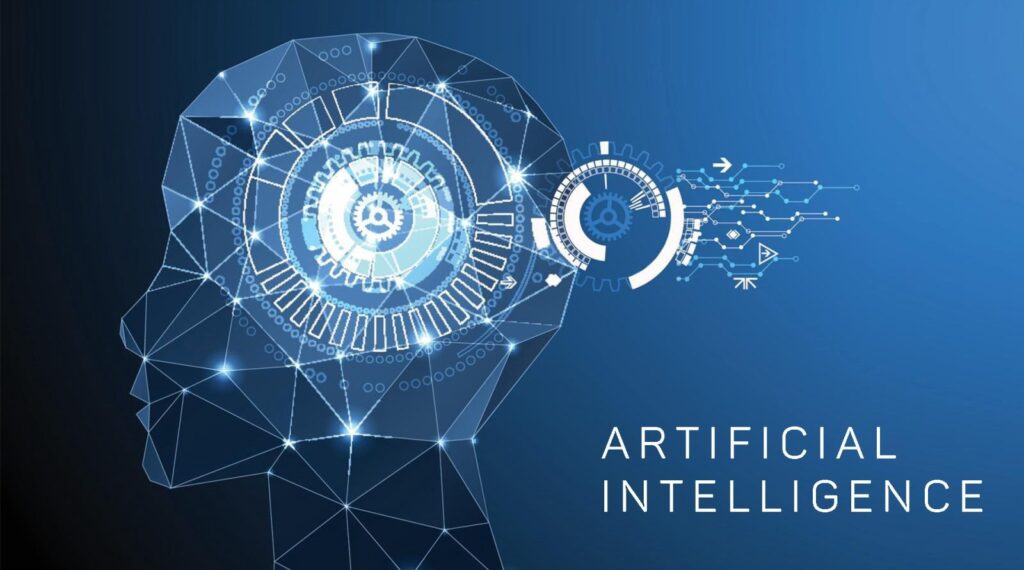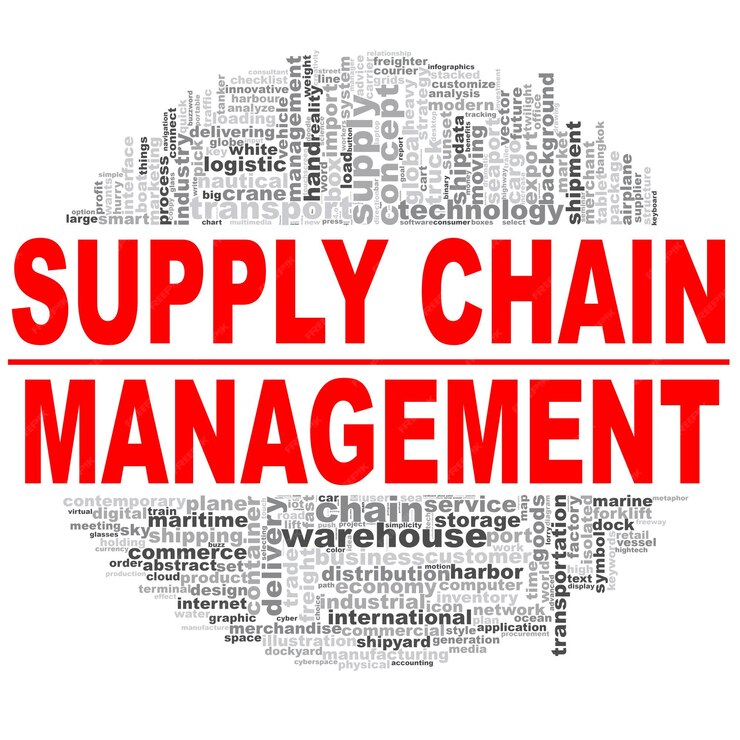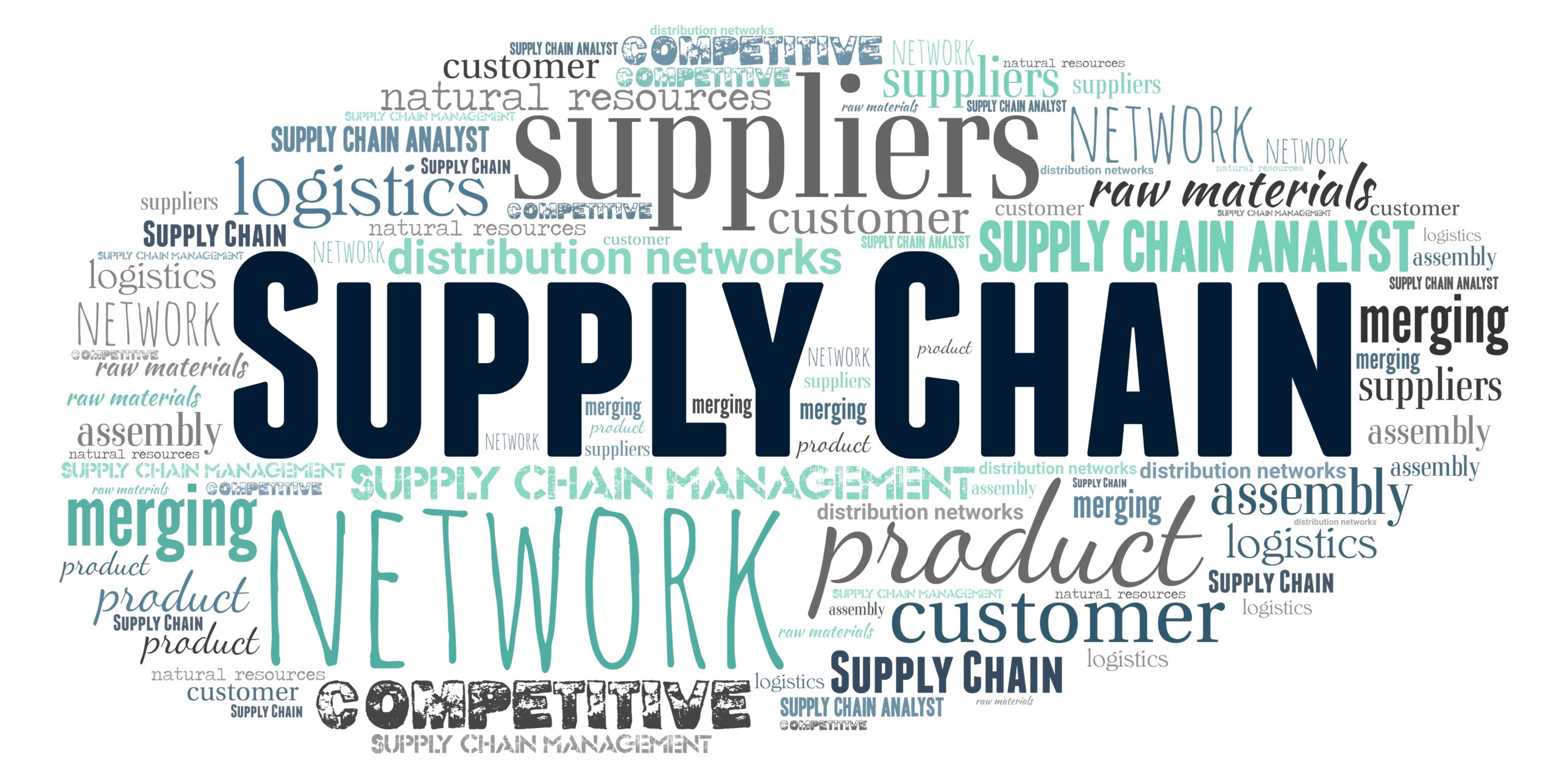Introduction
Artificial Intelligence’s (AI) future in the supply chain is brighter and more promising than ever. AI offers a great opportunity for businesses to stay on top of the global demand and revolutionize goods production, sourcing, and delivery. The future of ai in supply chain has been complex for a long time, involving inventory management, transport, forecasting, and logistics. AI is transforming these processes, improving efficiency, cost-savings, and decision-making. What does the future bring? What will the future of AI look like in supply chains? This article explores how AI is impacting supply chains. We’ll use real-world data and examples to show the effects of AI.

The Growing Importance of AI in Supply Chains
In recent years, the global supply chain landscape is changing rapidly. The pressure to stay competitive is greater than ever. McKinsey estimates that AI could add $1.2 trillion to international logistics and supply chains. The savings include transportation costs and improvements to demand forecasting. There is also a decrease in waste because of better resource management.
AI is playing a role in the supply chain that goes far beyond automating processes. Businesses can leverage machine learning algorithms to anticipate fluctuations in demand, maximize storage management practices and streamline delivery routes. AI helps companies to anticipate issues and reduce downtime while ensuring that goods are moved through the system efficiently. AI-powered platforms enable enterprises to get insights into their supply chain operations instantly, allowing them to make quick decisions.
AI-Powered Demand Forecasting: The Key to Efficiency
Supply chains have long recognized the importance of AI in forecasting demand. Businesses can better manage their inventory by using demand forecasting. This reduces both stockouts and overstocking. Demand forecasting methods that rely heavily on human judgment and historical data can be inefficient and lead to mistakes. AI, on the other hand, can analyze large datasets instantly and identify patterns that may be difficult for human analysts to see.
Companies such as Walmart and Amazon have begun using artificial intelligence (AI) in order to more accurately forecast demand. Walmart utilizes AI forecasting capabilities in individual store operations in order to optimize inventory across their supply chains resulting in reduced out-of-stock situations, reduced excess stock levels, and overall better customer satisfaction.
Warehouse Automation: AI’s Role in Streamlining Operations
Warehouse management is another area in which AI has made waves within the supply chain. Inventory tracking, order fulfillment, and shipping are time-consuming processes in traditional warehouses. AI-driven robotics and automated systems are able to drastically cut down on the amount of time required for these tasks.
Warehouse operations are being revolutionized by AI-powered robotics. These robots include those that Ocado, Alibaba, and other companies use. They can move and pick up items, scan barcodes, and more with high accuracy. A report from Capgemini states that 60% of warehouse operators already use AI-driven systems. This number will likely grow in the coming years.
AI can help warehouses reduce costs, but it also increases accuracy, speed, and scalability. Robots and AI will support human warehouse workers in the future, creating an environment that is safer and more productive.
AI in Logistics: Optimizing Delivery Routes
AI can optimize the delivery route, which will reduce both fuel cost and delivery time. The AI systems are able to determine optimal routes by analyzing historical data, real-time traffic, and weather patterns. It is possible to reduce costs and ensure that the goods reach their destination on time.
UPS has used an AI-powered system for route optimization called ORION for many years. ORION analyses millions of data points to determine the best routes for UPS drivers. ORION, according to the company ORION saved UPS 10 million gallons per year of fuel and reduced carbon emission by 100,000 tons each year.
The potential for reducing transportation costs, as well as the environmental impact of logistics driven by AI, will continue to grow. We can anticipate that AI will play a larger role in the future in making delivery systems cheaper, faster, and more environmentally friendly.

Supply Chain Risk Management with AI
AI plays an important role not only in improving supply chain efficiency but also in managing risk. The supply chain is vulnerable to many disruptions, including natural disasters and geopolitical issues. AI helps businesses to identify risks through the analysis of vast data sets and the detection patterns that indicate new threats.
IBM Watson AI is used to analyze data from social media and news reports, for example, in order to determine supply chain risk. AI is able to predict disruptions by monitoring sources such as social media and news in real time. It can also offer mitigation solutions. It is particularly useful in the increasingly globalized, interconnected networks of supply chains today. Even a minor disruption can cause ripples across the globe.
Businesses looking to remain competitive must address risks proactively in order to remain effective. Supply chain managers are now able to anticipate potential disruptions and make informed decisions in order to reduce their impact.
Personalized Supply Chain Solutions: AI Meets Customer Needs
Customers expect more tailored and personalized experiences in today’s market than ever. AI helps companies to meet this demand by helping supply chains deliver tailored solutions at a greater scale. AI predict customer preferences and behavior by analyzing their behaviors.
Companies like Nike and Adidas, for example, use AI to deliver personalized products more efficiently to their customers. AI-driven supply chain can adapt production schedules and inventory levels to real-time demand. Artificial Intelligence gives businesses the ability to provide customized services. AI will continue to advance, and more customized options within the supply chain should be available. AI could enable quicker deliveries with real time tracking or give companies custom items for purchase.
Real-Time Analytics for Better Decision-Making
AI’s ability to analyze in real time is another game changer. In the past businesses made decisions based on static reports and data. AI platforms can analyze data real-time, and give decision makers actionable insight when needed.
Businesses can make better decisions using real-time analytics about logistics, scheduling and production. Dell and Samsung have already begun using artificial intelligence (AI) analytics to streamline their supply chains – using multiple data sources they are making quicker decisions faster with greater precision than before.
AI’s ability to analyze and process vast quantities of data instantly will be even more important for companies looking to keep a competitive advantage as AI evolves. AI play a key role in the future of supply-chain decision-making, providing insights that can be used to make smarter and more data-driven choices.
Personal Insights
The most interesting aspect of AI for the supply chain is the ability to streamline complex processes. It’s satisfying to know that the technology is capable of automating tasks that used to be labor-intensive, such as predicting demand and optimizing routes.
When I see how quickly AI is being adopted by businesses in the warehouse and logistics industry, I am amazed at its speed. The companies that embrace AI as early adopters will be at a distinct advantage.
It’s fascinating to me that AI not only makes things cheaper and faster but also creates new possibilities for innovation and creativity in the supply chain. The future of personalized services is something that I am particularly interested in. AI can really transform the way businesses and customers interact.
AI is also a key player for me in the reduction of supply chain risk, particularly as we are facing more global challenges. Whether the risk is a natural disaster, a trade disruption, or pandemics and other diseases pose it, AI can be incredibly useful in helping companies navigate this.
I am most excited about the AI-driven efficiency of logistics and warehouse operations from a sustainable perspective. These technologies have a positive impact on fuel efficiency and reducing carbon emissions. I am excited to see how they continue to improve eco-friendly supply chain practices.
AI will likely streamline supply-chain processes but it also requires a new kind of workforce. The demand for AI and supply chain professionals will increase in the future, which is a great opportunity for me.

Conclusion
AI in supply chain is more than a mere trend. It represents a fundamental change in the way companies operate and compete. AI continues to progress rapidly, and offers greater cost-savings as well as innovative solutions for supply chains around the world. AI technology has already revolutionized this sector; from warehouse automation and demand forecasting to risk management and logistics optimization it is revolutionizing every aspect of this sector.
AI presents many opportunities but also challenges. This is especially true in the areas of data security and workforce transformation. Businesses must adapt and embrace these changes while also embracing AI’s potential. AI will continue to advance within supply chains and shape global trade over time.
Supply chain management will become more adaptable and customer-centric with time as businesses use AI to fully harness its immense potential in supply chains. Now is the time for businesses to leverage this change for increased success!
FAQs
How does AI affect supply chain management and logistics?
AI streamlines operations through inventory optimization, forecasting demand, warehouse automation, and logistics enhancement. The entire supply chain becomes more cost-effective and efficient.
What can AI do to improve forecasting demand?
AI can identify patterns in real time and forecast future demand with greater accuracy than conventional methods. This reduces overstocking, stockouts, and other problems.
AI warehouse automation: What is the benefit?
AI robots, automation, and order-fulfillment systems can speed up the tracking of inventory, orders, and packing while reducing costs, improving accuracy, and increasing operational efficiency.
What is AI-based delivery route optimization in logistics?
AI calculates the best routes to reduce fuel consumption and delivery time by using real-time data from traffic, weather, and historical trends.
What role does AI play in the supply chain?
AI can help businesses mitigate disruptions by assisting them to identify risks, such as natural disasters and geopolitical situations.
How can AI help improve customer experiences along the supply chain?
AI can help businesses better meet the needs of individual customers by customizing products, scheduling deliveries, and managing inventory.
Which companies have adopted AI for their supply chain?
AI is already being used by companies like Walmart, Amazon, and UPS to automate their warehouses and improve logistics.
What are the benefits of AI in supply chain decision-making?
AI allows supply chain managers to make data-driven, faster decisions about inventory, production schedules, and logistics.
How does AI affect the sustainability of supply chains?
AI reduces energy consumption and helps optimize resource management. It also contributes to a more environmentally friendly supply chain by reducing carbon emissions.
AI and supply chain challenge?
The challenges include a lack of skilled workers to handle AI technologies, concerns about data security, and upfront investments required to integrate AI into existing systems.

